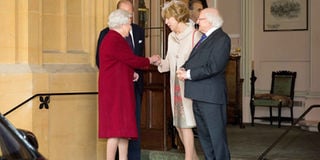Irish president wraps up historic state visit to Britain

Britain's Queen Elizabeth II (L) and Prince Philip, Duke of Edinburgh (2nd L), bid farewell to Irish President Michael D. Higgins (R) and his wife Sabina (2nd R) at Windsor Castle in Windsor, southern England on April 11, 2014. Higgins is the first Irish president to make a state visit to Britain since independence. AFP PHOTO / POOL / LEON NEAL
What you need to know:
- Laughing and smiling, the monarch waved off Higgins at Windsor Castle, west of London, after a four-day trip that both countries hope underlines the new strength of their relations.
Queen Elizabeth II bade farewell Friday to Irish President Michael D. Higgins at the end of a historic state visit to Britain that he called "uplifting".
Laughing and smiling, the monarch waved off Higgins at Windsor Castle, west of London, after a four-day trip that both countries hope underlines the new strength of their relations.
The president earlier hailed his "memorable" state visit, the first by an Irish president since independence from Britain in 1922, as "so positive, so uplifting and so hopeful".
Higgins claimed the visit showed both countries had come to terms with their painful history, and both he and the queen celebrated the hard-won peace in Northern Ireland, which remains part of the United Kingdom.
But the presence of Northern Ireland's Deputy First Minister Martin McGuinness, a former commander of the Irish Republican Army paramilitary group, at two state events at Windsor caused outrage in some quarters.
Former Conservative minister Norman Tebbit said he hoped one of McGuinness's former IRA colleagues "might shoot him in the back" for "bowing to the queen".
Tebbit, who was injured during an IRA bombing in Brighton in 1984 which targeted a Conservative Party conference, later withdrew the comments, saying they were not meant to be taken literally.
Higgins's visit came three years after the queen made a ground-breaking first trip to the republic, which helped to heal deep-rooted unease and put British-Irish relations on a new footing.
After leaving Windsor, Higgins, a poet and former arts minister, visited Stratford-upon-Avon in central England -- the birthplace of playwright William Shakespeare.
He was treated to a brief performance from "Henry IV" and took to the stage himself at the Royal Shakespeare Theatre.
"The words exchanged between Ireland and England have often been part of a long and sometimes tortured exchange," he said.
"If it was once the forced language of conquest, it is today the very language in which we have now come to delight and share."
He spoke of "the present happy face of relations between our two people as we pass slowly but surely into a new kind of relationship".
Among those in the crowd outside was 65-year-old Philomena Hodgetts, whose family is originally from Northern Ireland, where an estimated 3,500 people died during three decades of sectarian violence.
"His meeting with the queen, MPs, and other state dignitaries speaks volumes," she said.
"It is lovely that two nations, which have gone through so much together... can now show the world how to achieve peace and friendship."
Around 2,000 people also turned out to see Higgins at nearby Coventry Cathedral.
During the visit, Higgins has stayed at Windsor Castle, been treated to lavish banquets and receptions, and addressed both houses of parliament.
He met British political leaders and attended a concert celebrating Irish music and culture at the Royal Albert Hall in London.





